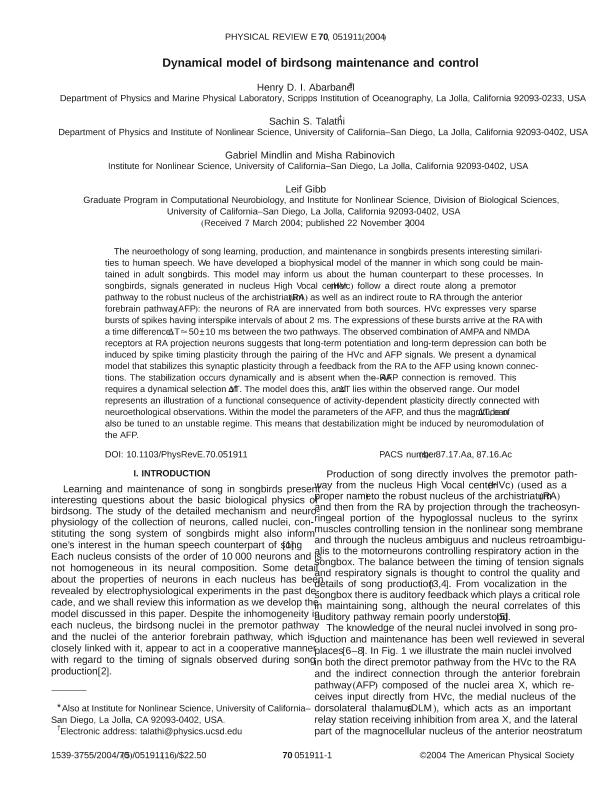Mostrar el registro sencillo del ítem
dc.contributor.author
Abarbanel, Henry D. I.
dc.contributor.author
Talathi, Sachin S.
dc.contributor.author
Mindlin, Bernardo Gabriel

dc.contributor.author
Rabinovich, Misha
dc.contributor.author
Gibb, Leif
dc.date.available
2019-04-08T16:17:40Z
dc.date.issued
2004-12
dc.identifier.citation
Abarbanel, Henry D. I.; Talathi, Sachin S.; Mindlin, Bernardo Gabriel; Rabinovich, Misha; Gibb, Leif; Dynamical model of birdsong maintenance and control; American Physical Society; Physical Review E: Statistical Physics, Plasmas, Fluids and Related Interdisciplinary Topics; 70; 5; 12-2004; 1-16
dc.identifier.issn
1063-651X
dc.identifier.uri
http://hdl.handle.net/11336/73394
dc.description.abstract
The neuroethology of song learning, production, and maintenance in songbirds presents interesting similarities to human speech. We have developed a biophysical model of the manner in which song could be maintained in adult songbirds. This model may inform us about the human counterpart to these processes. In songbirds, signals generated in nucleus High Vocal center (HVc) follow a direct route along a premotor pathway to the robust nucleus of the archistriatum (RA) as well as an indirect route to RA through the anterior forebrain pathway (AFP): the neurons of RA are innervated from both sources. HVc expresses very sparse bursts of spikes having interspike intervals of about [Formula presented]. The expressions of these bursts arrive at the RA with a time difference [Formula presented] between the two pathways. The observed combination of AMPA and NMDA receptors at RA projection neurons suggests that long-term potentiation and long-term depression can both be induced by spike timing plasticity through the pairing of the HVc and AFP signals. We present a dynamical model that stabilizes this synaptic plasticity through a feedback from the RA to the AFP using known connections. The stabilization occurs dynamically and is absent when the [Formula presented] connection is removed. This requires a dynamical selection of [Formula presented]. The model does this, and [Formula presented] lies within the observed range. Our model represents an illustration of a functional consequence of activity-dependent plasticity directly connected with neuroethological observations. Within the model the parameters of the AFP, and thus the magnitude of [Formula presented], can also be tuned to an unstable regime. This means that destabilization might be induced by neuromodulation of the AFP. © 2004 The American Physical Society.
dc.format
application/pdf
dc.language.iso
eng
dc.publisher
American Physical Society

dc.rights
info:eu-repo/semantics/openAccess
dc.rights.uri
https://creativecommons.org/licenses/by-nc-sa/2.5/ar/
dc.subject.classification
Astronomía

dc.subject.classification
Ciencias Físicas

dc.subject.classification
CIENCIAS NATURALES Y EXACTAS

dc.title
Dynamical model of birdsong maintenance and control
dc.type
info:eu-repo/semantics/article
dc.type
info:ar-repo/semantics/artículo
dc.type
info:eu-repo/semantics/publishedVersion
dc.date.updated
2019-04-05T18:26:01Z
dc.journal.volume
70
dc.journal.number
5
dc.journal.pagination
1-16
dc.journal.pais
Estados Unidos

dc.journal.ciudad
Nueva York
dc.description.fil
Fil: Abarbanel, Henry D. I.. Scripps Institution Of Oceanography; Estados Unidos
dc.description.fil
Fil: Talathi, Sachin S.. University of California at San Diego; Estados Unidos
dc.description.fil
Fil: Mindlin, Bernardo Gabriel. University of California at San Diego; Estados Unidos. Consejo Nacional de Investigaciones Científicas y Técnicas. Oficina de Coordinación Administrativa Ciudad Universitaria. Instituto de Física de Buenos Aires. Universidad de Buenos Aires. Facultad de Ciencias Exactas y Naturales. Instituto de Física de Buenos Aires; Argentina
dc.description.fil
Fil: Rabinovich, Misha. University of California at San Diego; Estados Unidos
dc.description.fil
Fil: Gibb, Leif. University of California at San Diego; Estados Unidos
dc.journal.title
Physical Review E: Statistical Physics, Plasmas, Fluids and Related Interdisciplinary Topics

dc.relation.alternativeid
info:eu-repo/semantics/altIdentifier/doi/http://dx.doi.org/10.1103/PhysRevE.70.051911
Archivos asociados
